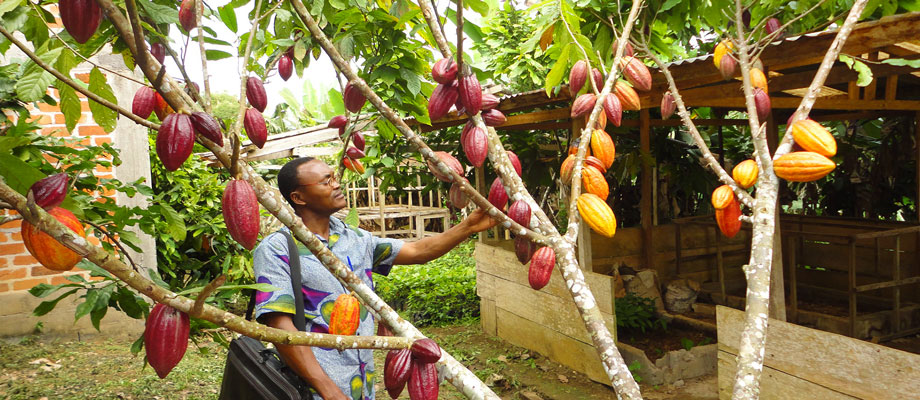Does demand for superior quality cocoa mean higher prices for cocoa producers?

Demand for high-end and specialty chocolate is growing. But does superior quality cocoa translate into higher market prices and incomes for cocoa producers?
That is one of the big questions a new market intelligence study hopes to answer.
The FAO Investment Centre and the Alliance of Bioversity International and CIAT/Cocoa of Excellence have teamed up on the study to deepen their understanding of the cocoa value chains in major cocoa-producing countries.
According to FAO Investment Centre Service Chief Wafaa El Khoury, the study is designed “to give governments, industry stakeholders, producers and financing institutions evidence of the scope and opportunities for investment to increase cocoa quality across all market segments for a more competitive, profitable, sustainable and equitable cocoa value chain.”
She added that it was important to “ensure that a fairer share of the value added goes to smallholder cocoa producers.”
Brigitte Laliberté, Acting Director of Cocoa of Excellence, noted that the study is filling a knowledge gap by zeroing in on cocoa quality.
“We want to provide evidence on the major roadblocks for cocoa-producing countries to define and move into higher cocoa qualities linked to a greater use of genetic diversity,” she said. “We are also looking at whether cocoa producers who invest in producing a higher quality product are rewarded with higher prices.”
She added that the steps taken after harvest – fermentation, drying – are crucial to that higher quality product with greater market appeal.
“You can have very healthy trees that produce cocoa pods and beans with excellent potential, but if fermentation is not done properly, the resulting cocoa may not taste good,” she said.

Challenges in cocoa-producing countries
The global cocoa and chocolate market was valued at over USD 46 billion in 2021. But most of the millions of individual small-scale producers who rely on cocoa for their livelihoods live below the poverty line.
Low market prices and lack of financial support provide little incentive for them to invest in quality-enhancing farm management and post-harvest practices.
About 10 percent of cocoa production is currently traded as so-called “fine flavour”, while 90 percent is traded as “bulk”.
Unlike other commodities like coffee, cocoa is mainly traded based on the key physical characteristics of the beans – size, weight and moisture content.
But for a commodity resulting in a product bought and consumed largely for its taste, there is an urgent need to adopt cocoa grading standards on quality and flavour.
Untapped potential
All cocoa-producing countries have the potential to produce superior quality cocoa and diverse flavour profiles based on quality, origin and sustainable practices. But efforts by producers to do so are not yet adequately rewarded or guaranteed.
“The way the market is going, people will be willing to pay a lot for their chocolate bars, but they want something that not only tastes good but is also good for the planet, doesn’t use forced child labour, doesn’t contain food contaminants or heavy metals and provides a fair price to cocoa producers,” Laliberté said.
The study team will assess the cocoa value chains in depth in Cameroon, Colombia, Côte d’Ivoire, Ecuador, Ghana, Guatemala, Indonesia and Peru, while also looking at 11 other cocoa-producing countries to validate key findings.
An analysis of the global market will shed light on the drivers and roadblocks for increasing cocoa quality, securing a decent living income for producers and safeguarding the genetic diversity contributing to the potential for superior quality.
The team will look at current gaps in the capacity of governments, processors and producers in origin countries to recognize, produce, promote and trace cocoa quality. They will also assess the investment needed to bridge that gap.
And they will evaluate the cocoa ecosystem – governance, regulatory systems, environmental impact, climate change, cultural and production practices, gender, youth – to identify ways to strengthen supply chains, from tree to bar.

Informing investment in quality and sustainable cocoa
The study’s outcomes will inform the design of future cocoa programmes and strategies, including targeted investments and related policies and institutions (e.g., standards) to improve cocoa quality, capacity building at origin, data-driven innovations and key digital and physical infrastructure.
The study will complement ongoing work under the Sustainable Cocoa Initiative, funded by the European Union and FAO. The initiative is pushing for progress on ensuring a living income for cocoa farmers, protecting and restoring forests and eliminating child labour.
For more than ten years, Cocoa of Excellence has developed a broad understanding and capacity on cocoa quality and genetic diversity, creating tools and systems to evaluate, promote, preserve and recognize cocoa attributes at a global level.
In addition to leading the Sustainable Cocoa Initiative, FAO is involved in dialogue and analytical work on cocoa, including projects funded by the World Bank and other financing partners.
